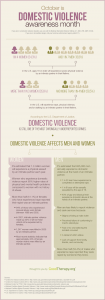 For many people, there are few things that evoke a more reassuring sense of warmth, comfort, stability, and safety than going home. Many people see their home as a personal stronghold—a bastion of unconditional love and support. At home we tend to have more freedom, more time for family, and for a few hours, at least, we are afforded an escape from the hustle of the day. For victims of domestic violence, however, the home is anything but a refuge.
For many people, there are few things that evoke a more reassuring sense of warmth, comfort, stability, and safety than going home. Many people see their home as a personal stronghold—a bastion of unconditional love and support. At home we tend to have more freedom, more time for family, and for a few hours, at least, we are afforded an escape from the hustle of the day. For victims of domestic violence, however, the home is anything but a refuge.
According to the National Coalition Against Domestic Violence (NCADV), domestic violence is the intentional physical assault, intimidation, battery, sexual assault, and/or use of other threatening behavior by one member of a household against another. Other less obvious forms of abusive behavior include stalking, the use of threatening looks or gestures, attempts to control the reproductive health of an intimate partner (for example, refusing to use contraception during intercourse), and displays of psychological aggression such as putting down, humiliating, or isolating an intimate partner.
The Shocking Prevalence of Domestic Violence in America
Intimate partner violence (IPV), a more narrowly defined term for domestic violence, affects both men and women, married (spousal abuse) or unmarried. The US Department of Justice estimates that 1.3 million women and 835,000 men are victims of physical violence by an intimate partner each year.
The NCADV also reports that among all domestic violence victims, 85% are women; on average, one in every four American women will experience domestic violence in her lifetime. Crime statistics also indicate that close to one-third of all female homicide victims were killed by an intimate partner.
Domestic Violence: The Psychological and Emotional Wounds
Broken, bruised, and battered features are the obvious signs of domestic abuse. However, just as physical injuries demand our care and attention, it is imperative that the psychological and emotional wounds suffered from these traumatic events also get addressed.
The American Psychological Association (APA) explains that psychological trauma is “an emotional response to a terrible event …” which interferes with an individual’s ability to function as he or she would under normal circumstances. While the psychological impact of a particular incident will vary from person to person, most individuals experience increased levels of emotional distress after going through traumatic events. Thankfully, these feelings of distress often subside if adequate support is received from family members, friends, mental health professionals, and other social networks.
For victims of spousal abuse and other types of intimate partner violence, however, the situation is not always so clear-cut. Fear of retaliation from the abusive partner might prevent victims from seeking needed assistance. Feelings of shame and embarrassment, especially among male victims, can also be a major hindrance to seeking out services or aid. This lack of emotional support can lead to heightened fear, anxiety, depression, anger, posttraumatic stress, social withdrawal, the use of illicit drugs, alcohol dependence, and even suicidal ideation.
It is clear that the psychological and emotional wounds of domestic violence are devastating. They can potentially haunt victims for many years and rob them of the ability to live a rich, full life. These wounds are completely undetectable by x-rays and too often go untreated.
The Social Impact of Domestic Violence
Domestic violence often has a ripple effect that tears through the fabric of the victim’s life. The psychological, emotional, and social impacts of domestic violence can linger long after the violence has subsided, and even after the victim has left the abusive partner.
The National Center for PTSD, a prominent research and education organization that studies the psychological effects of trauma, has identified several scenarios that indicate red flags in an unhealthy relationship. An unhealthy relationship may be indicated when one partner:
- Has complete control of all household finances.
- Limits or completely closes off the other partner’s social life. He or she may isolate the other partner from friends and family.
- Consistently threatens to ruin the reputation of the other partner, especially after he or she has expressed a desire to end the relationship.
- Repeatedly tries to scare the other by breaking things, punching holes in the wall, and hurting or threatening to hurt pets.
- Systematically evokes feelings of guilt or shame in the other partner.
These types of coercive and controlling behaviors are often present in cases of domestic violence, and can have a profound impact on how a victim of abuse is able to function socially, even after leaving an abusive relationship. If an individual is financially dependent on his or her abusive partner, any decision to escape the abuse carries with it the real possibility of homelessness. One study (2003) showed that among a sample of 110 women who had experienced domestic abuse, 38% reported homelessness.
Issues of poverty and homelessness are closely linked to the abusive act of isolating an intimate partner from family, friends, and other sources of social support. Under normal circumstances, a person with strong social connections will look to his or her relatives and/or peers when assistance is needed. However, isolation from these support groups may cause the connections to wither. In the end, people who experience domestic violence might reason that they are completely alone in their struggles and former resources are no longer available.
Even if a survivor is successful in escaping from a violent relationship, the scars of past abuse can significantly influence future intimate relationships. The National Center for PTSD explains that some people who have endured IPV may not even believe that healthy relationships exist. Thus, they might enter new relationships with the same unhealthy expectations that they had previously. Other challenges could include intrusive memories of past abuse (for example, during intimate moments with a new partner), nightmares, communication challenges, and feelings of worthlessness.
The Effect of Domestic Violence on Children
Research shows that a child’s development can be adversely affected by domestic abuse. One study conducted by Appel and Holden (1998) even emphasizes a large overlap between households where there is IPV and child abuse. The National Center for PTSD estimates this overlap to be about 40-60%. According to statistics from the NCADV, boys who are exposed to domestic violence are twice as likely to abuse their intimate partners and children when they grow up.
Similarly revealing statistics from the American Bar Association show that girls with a history of physical or sexual abuse were more likely than non-abused girls to engage in risky behavior such as smoking (26% versus 10%), drinking (22% versus 12%), and substance abuse (30% versus 13%). Abused girls were also more likely to binge eat and purge than non-abused girls (32% versus 12%). In another study involving 2,245 children and teenagers, it was highlighted that recent exposure to domestic abuse was a primary factor in predicting future violent behavior. Even children are not directly abused, they are affected by witnessing domestic violence.
Where and How You Can Get Help
If you or a loved one is a victim of domestic abuse, please seek help. The longer abuse persists, the more damage it can cause physically and psychologically. There is support nationally and in your community to help you end the cycle of violence and move beyond it. Here are some resources if you are in trouble:
- If you are hurt or in immediate danger, please call 911 and do what you can to get in a safer situation.
- Contact the National Domestic Violence Hotline at 800-799-SAFE (7233) or 800-787-3224 (TDD). The national hotline can guide you to local shelters in your community and/or vital services.
- For local resources, visit this section of womenshealth.gov to find support and safe haven in your state.
- If you are searching online for help, be sure to clear your Internet browsing history so that your abusive partner cannot track your searches. Firefox, Internet Explorer, and Google Chrome all have options to clear browsing history located in the upper-right corner below the red X to close the window.
Even after the violence has subsided, the psychological effects of domestic violence can stick around. Seeking the help of a mental health professional such as a counselor or a therapist can be critical to helping a victim finding peace. If you or a loved one is a victim of domestic violence, consider talking to a professional with the experience and knowledge to help a person overcome the psychological wounds of domestic violence.
References:
- American Bar Association, Commission on Domestic and Sexual Violence. (n.d.). Domestic violence statistics. Retrieved September 26, 2014, from http://www.americanbar.org/groups/domestic_violence/resources/statistics.html
- American Psychological Association. (n.d.). Trauma. Retrieved September 26, 2014, from http://www.apa.org/topics/trauma/
- Appel, A. E., & Holden, G. W. (1998). The co-occurrence of spouse and physical child abuse: A review and appraisal. Journal of Family Psychology, 12, 578–599.
- Australian Psychological Society. (n.d.). Understanding and managing psychological trauma. Retrieved September 26, 2014, from http://www.psychology.org.au/publications/tip_sheets/trauma/
- Baker, C.K., Cook, S.L. & Norris, F.H. (2003). Domestic violence and housing problems. A contextual analysis of women’s help-seeking, received informal support, and formal system response [Abstract]. Violence Against Women, 9(7), 754-783. doi:10.1177/1077801203009007002
- Black, M.C., Basile, K.C., Breiding, M.J., Smith, S.G., Walters, M.L., Merrick, M.T., Chen, J., & Stevens, M.R. (2011). The National Intimate Partner and Sexual Violence Survey (NISVS): 2010 Summary Report. Atlanta, GA: National Center for Injury Prevention and Control, Centers for Disease Control and Prevention.
- Centers for Disease Control and Prevention. (2013). Intimate partner violence: Consequences. Retrieved September 26, 2014, from http://www.cdc.gov/violenceprevention/intimatepartnerviolence/consequences.html
- National Coalition Against Domestic Violence. (n.d.). Domestic violence facts. Retrieved from http://www.ncadv.org/files/DomesticViolenceFactSheet%28National%29.pdf
- National Coalition Against Domestic Violence. (n.d.). Male victims of violence. Retrieved from http://www.ncadv.org/files/MaleVictims.pdf
- S. Department of Veterans Affairs, National Center for PTSD. (2014). Intimate partner violence. Retrieved September 26, 2014, from http://www.ptsd.va.gov/public/types/violence/domestic-violence.asp

The preceding article was solely written by the author named above. Any views and opinions expressed are not necessarily shared by GoodTherapy.org. Questions or concerns about the preceding article can be directed to the author or posted as a comment below.


 Stress, Stigma Increase Domestic Violence in Same-Sex Couples
Stress, Stigma Increase Domestic Violence in Same-Sex Couples Emotional Outcomes for Child Witnesses to Domestic Violence
Emotional Outcomes for Child Witnesses to Domestic Violence Four Ways to Help Domestic Violence Survivors Without Opening Your Wallet
Four Ways to Help Domestic Violence Survivors Without Opening Your Wallet

